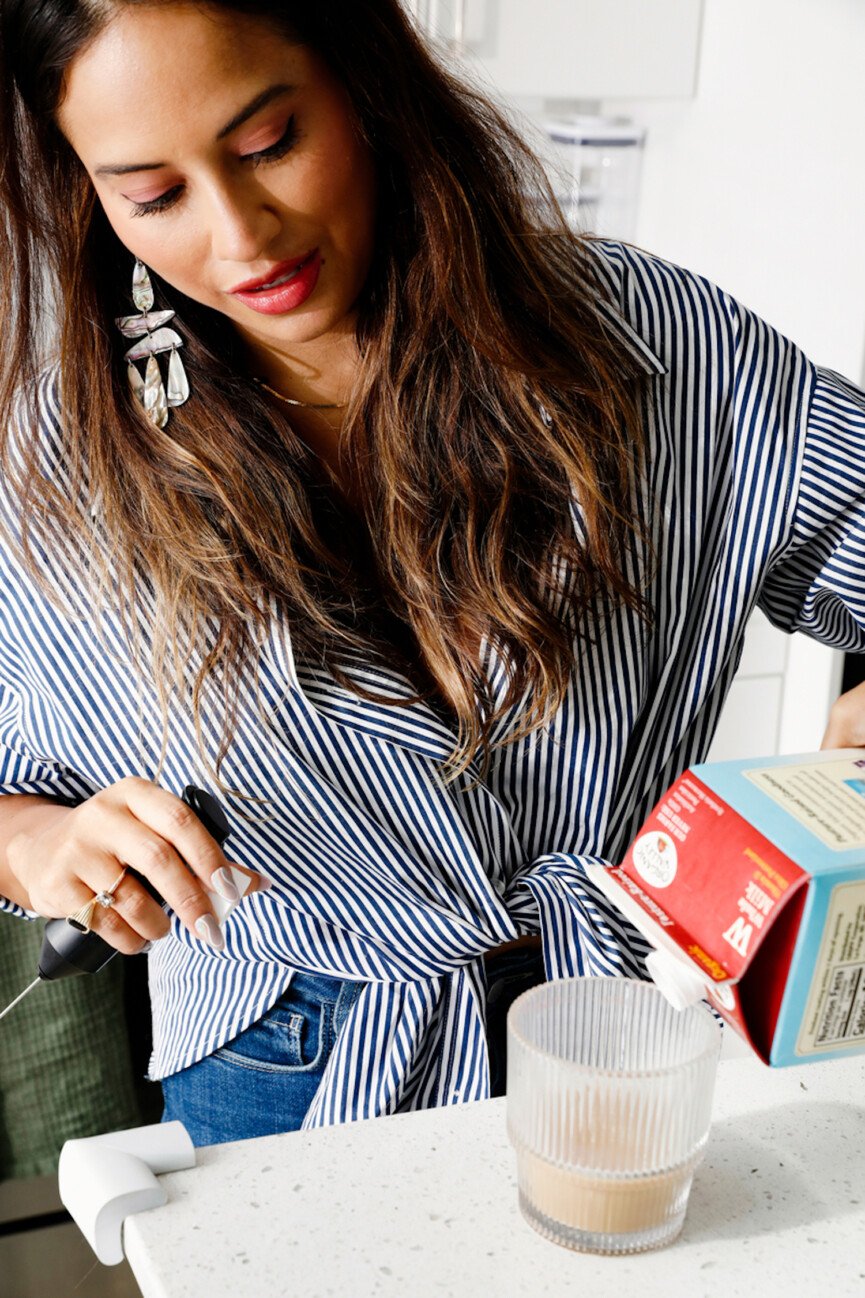We may receive a portion of sales if you purchase a product through a link in this article.
Is it just me, or is the world of plant-based milks incredibly confusing? We know the basics, like what they’re made of (for the most part) and which we like in our morning coffee. But do we really know the nitty gritty of non-dairy milks? I know I didn’t, which is why I felt it was high time to find the best non-dairy milk for all your household uses. Consider this your guide to finding the best non-dairy milk for you.
I’ll start by saying that I truly do love dairy milk (gasp, I know). I’ve never been one to shy away from a good old glass of two percent. But with that glorious glass often comes some not-so-friendly gut issues. I’ll spare you the details, so let it suffice to say that I’ve enjoyed watching non-dairy products rise to fame. Where we used to be limited, we now have so many options for yogurts, cheeses, milks, butters, condiments, etc.
But with so many options, it can be difficult to decide. To spare you the headache (and stomach ache), I took a deep dive to help locate the best non-dairy milk for you.

Found: The Best Non-Dairy Milk
Aside from dairy milk, I’m a devout oat milk drinker. I drink it every single day in my coffee and occasional smoothie. I. Am. Hooked. I love the taste, creaminess, and overall feel of oat milk. That said though, I’ve never stopped to consider exactly what I’m putting into my body until now. Is oat milk really the best non-dairy milk? Are there others with better benefits? What should I look for when buying non-dairy milk? The questions go on.
To help you meet your match made in dairy-free heaven, I broke it down into a digestible format that you can use to bring the best non-dairy milk into your life. Here’s what we’re taking into account:
- Taste
- Ingredients
- Nutrition specs
- Cook-ability
I also chatted with our resident nutritionist and wellness editor Edie Horstman to get her expert opinion on the non-dairy milks she loves and recommends. Read on for a deep dive into ten popular non-dairy milk options!

Oat Milk
Oat milk has been steadily growing in popularity. It’s creamy, tasty, and froths well—making it a perfect choice for non-dairy lattes. It has a slightly nutty and sweet flavor profile that most people enjoy. When it comes to oat milk as a health food, however, you may want to think twice.
“It’s the non-dairy milk with the highest amount of starch,” Horstman shares. “Starch is converted into simple sugars when you digest it and this raises blood sugar. For most of us, oat milk sends us on a blood sugar roller coaster, which isn’t the goal!”
Pros:
- Creamy and delicious
- Makes a great vegan cappuccino
Cons:
- Drinking it regularly may cause insulin resistance (a precursor to diabetes) and cardiovascular disease
- High in pesticides if not organic
Best for: Non-dairy lattes and cappuccinos
Almond Milk
Almond milk is my personal go-to non-dairy milk of choice. Its mild taste and slight sweetness makes it tasty for sipping, and it’s great in cereal and in baking recipes. “Almond milk is one of my favorites!” Horstman exclaims. “It’s lactose-free and is typically fortified with vitamin D, vitamin E, and calcium.” She also notes that unsweetened almond milk is easy to find and low in calories. A great choice all around!
Pros:
- Available at most grocery stores
- Won’t spike your blood sugar
- Often infused with vitamins
Cons:
- Low protein
- Producing almond milk requires high water consumption, which causes environmental concerns
Best for: Sipping and baking
Coconut Milk
If you love the taste of coconut, you’re sure to love coconut milk. The coconut flavor profile is strong, even when mixed with other ingredients. “I love the rich and creamy texture of coconut milk. It’s a great source of healthy fats and nutrients like iron and magnesium,” Horstman shares. She does, however, recommend checking out the ingredients before you indulge. “It’s low in protein and most commercial varieties like you’d find at your local coffee shop or Starbucks contain added sugars and thickeners,” she says.
Pros:
- Great source of healthy fats
- Rich and creamy texture
Cons:
- Doesn’t froth well for lattes
- Can contain added sugar
Best for: Anyone who loves coconut! And Southeast Asian cooking.
Soy Milk
Soy milk crawled so almond milk could walk and oat milk could run. It’s a sweet and creamy non-dairy milk that packs a nutritional punch. It’s one of Horstman’s favorites, particularly non-GMO, organic, unsweetened soy milk. “It’s a non-dairy milk with a high amount of protein. In fact, it’s pretty comparable to cow’s milk in terms of protein,” she says. “Soy milk is also linked to improved heart health, thanks to its isoflavones: a plant compound.”
Pros:
- High in protein
- Can improve heart health
- Froths well for lattes
Cons:
- Soy is a common allergy, some may need to avoid it
- Can contain lots of added sugar
Best for: Lattes, cereal, and sipping
Flax Milk
Flax milk is an underrated non-dairy milk, if you ask me. It’s smooth, creamy, neutral, and blends perfectly with whatever you’re adding it to. It’s also a great source of vitamins like vitamins D2 and B12. In terms of taste, flax milk has just the right amount of seedy flavor without overdoing it, which means you don’t have to worry about it taking over. It’s beautifully mild and naturally flavorful, to put it plainly.
While it may not be as thick as an oat or almond milk, flax milk has a great consistency that works well in baked goods, beverages, or on its own. “Flax milk isn’t as easy to find as almond, coconut, and soy, but it’s a fabulous option that’s rich in omega-3 fatty acids and protein,” Horstman says. “I love that flax milk is gluten and glyphosate-free too.”
Pros:
- High in protein
- A good source of healthy fat
- Sugar-free and allergen-friendly
Cons:
Best for: Coffee, smoothies, and cereal
Rice Milk
Rice milk is one of the most basic and low-key non-dairy milks out there. It’s stood the test of time over and over again and continues to weave itself into many people’s daily lives. With a mild taste, it’s a favorite among plant-based milk enthusiasts for good reason. Despite its name, rice milk usually doesn’t boast an overly rice-y taste. In this variety, the brown rice actually lends the milk more of a wheat-forward flavor that’s very neutral and blendable. With a solid vitamin D and calcium content, rice milk is a good alternative to dairy milk for those looking for something that closely resembles skim milk.
Pros:
- Allergen-friendly
- Can be found in most grocery stores
Cons:
Best for: Smoothies and shakes
Hemp Milk
Hemp milk wins the prize for excellent nutritional value. With three grams of protein per cup, plus extra omega-3 and omega-6 fatty acids (something hemp seeds are known for), you’re getting a lot of bang for your buck. It’s also low on the calorie and carb count. With a neutral taste, it blends well with anything you’re using it in.
If you like the taste of hemp seeds, you’ll love hemp milk! Because, well, it’s made of them. “Like flax and soy milk, hemp milk is high in protein. And like flax milk, specifically, it’s also packed with omega-3 fatty acids and contains a good amount of magnesium and vitamin D,” Horstman says. “It’s allergen-friendly if you’re allergic to nuts and you can easily make it homemade without a strainer!”
Pros:
- High in protein
- Allergen-friendly
Cons:
- Can be hard to find in stores
Best for: Cooking and baking
Cashew Milk
Cashew milk is known for having a distinct nutty flavor and a creamy texture. “You don’t get a great bang for your nutritional buck with cashew milk, but it does have a creamy texture and unsweetened cashew milk is low in calories,” Horstman remarks. “Similar to hemp milk, you don’t need to strain homemade cashew milk!”
Pros:
Cons:
Best for: Coffee
Pea Milk
Admittedly, pea milk isn’t Horstman’s go-to, but the nutritional content has to be noted. “It’s high in protein (more than a serving of cow’s milk), it’s allergen-friendly, and it has a relatively low environmental impact,” she says. “Unfortunately, most pea milks have added oils, like canola or safflower oil—this isn’t an issue in small quantities, but it isn’t necessarily something to be guzzling every day.” Pea milk is made with pea protein and is nut-free, so those with allergies may find this to be an ideal non-dairy milk to try.
Pros:
Cons:
- Made with canola and safflower oil
Best for: Cooking, protein shakes and smoothies
Hazelnut Milk
Hazelnut milk may not be making waves like almond or oat milk yet, but that doesn’t mean it’s not worth checking out. It’s rich, creamy and the limited brands that are offering it are keeping it simple without adding oils and preservatives. It foams well, making it a great choice for lattes and hot cocoa. The flavor profile is deliciously nutty, and adding a bit of cocoa powder and maple syrup to it is like sipping on Nutella. Yum!
Pros:
- Packed with B vitamins and healthy fats
- Froths well for lattes
Cons
Best for: Coffee drinks







